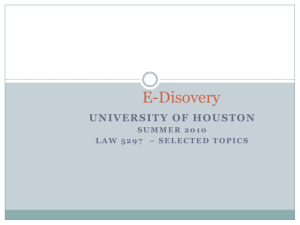STMU_HomecomingCLE2012Rodriguez
advertisement
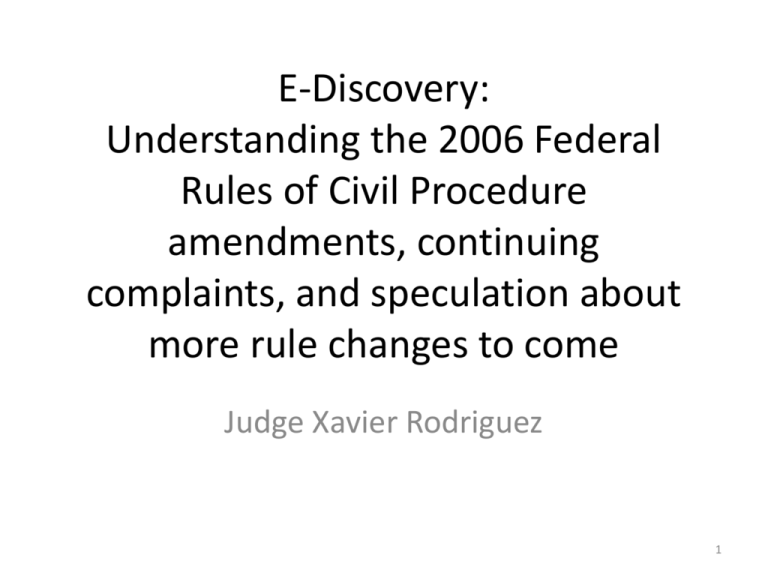
E-Discovery: Understanding the 2006 Federal Rules of Civil Procedure amendments, continuing complaints, and speculation about more rule changes to come Judge Xavier Rodriguez 1 Effect of ESI • Explosion (amount) of information – Emails – Text messages • Variety of locations where ESI may be stored – Hard drives – Flash drives – Cell phones/PDAs 2 Attorneys need to understand how ESI is stored and retrieved • Is the ESI custodian-based or enterprise-based • How is the ESI stored? – Hard drive or shared drive – Nearline – accessible removable media – Offline – backup tape • How are backups done – structured (frequency)/unstructured; full backup/incremental – Cloud 3 Duty to Preserve ESI • Once litigation is reasonably anticipated, a potential party to that litigation must not destroy unique, relevant evidence that might be useful to an adversary. • The duty to preserve extends to the party's or potential party's employees likely to have relevant information—the ‘key players.’ 4 Litigation Holds & Monitoring • Once duty to preserve has been triggered, a party cannot continue routine retention/destruction policies • Spoliation is the destruction or material alteration of evidence or to the failure to preserve property for another's use as evidence in pending or reasonably foreseeable litigation 5 Litigation Holds & Monitoring • Determine when duty to preserve arises • Determine what data (and metadata) must be preserved – Possession, custody or control • Determine how to assure preservation 6 Rule 26(f)Meet and Confer • Prepare for the meet and confer – Meet with client and its IT department prior – At the meet and confer, you may be expected to articulate where and how your client’s information is created, maintained, stored or destroyed – Consider sending opposing counsel an agenda of items to be discussed at the meet and confer 7 Rule 26(f)Meet and Confer • In conferring, the parties must consider the nature and basis of their claims and defenses and the possibilities for promptly settling or resolving the case; make or arrange for the disclosures required by Rule 26(a)(1); discuss any issues about preserving discoverable information; and develop a proposed discovery plan. 8 Rule 16 Initial Scheduling Conference • The scheduling order may: • (i) modify the timing of disclosures under Rules 26(a) and 26(e)(1); • (ii) modify the extent of discovery; • (iii) provide for disclosure or discovery of electronically stored information; • (iv) include any agreements the parties reach for asserting claims of privilege or of protection as trialpreparation material after information is produced; • (v) set dates for pretrial conferences and for trial; and • (vi) include other appropriate matters. 9 Rule 16 Initial Scheduling Conference • On motion or on its own, the court may issue any just orders, including those authorized by Rule 37(b)(2)(A)(ii)-(vii), if a party or its attorney: • (A) fails to appear at a scheduling or other pretrial conference; • (B) is substantially unprepared to participate--or does not participate in good faith--in the conference; or • (C) fails to obey a scheduling or other pretrial order. 10 Duty to Cooperate • Balance between legitimate discovery needs and costs and burdens • Sedona Conference “Cooperation Proclamation” • E-Discovery Mediation 11 Collection • • • • • Keyword searches Fuzzy searches Boolean searches Clustering Searching for parameters – Date range – Metadata – Individual 12 Collection • An important aspect of search is the documenting of search results for each search. Documenting search results enables: – Defensibility of search results – Communicating search methods and results both within internal legal e-discovery teams and to outside parties such as outside counsel and opposing parties – Monitoring and historical tracking progress of searches – Assessment of search strategies, search technologies and specific vendor selections. 13 Review • Validation of results is an important phase of search. Some of the overall goals of this phase are: – Ensure in a cost-effective way whether a set of searches performed are satisfying a production request – Ensure that the validation produces enough results in a timely way, to assess and evaluate whether we need to modify the initial set of searches – Allow for comparison of alternative search methodologies 14 Production & Rule 34 • Unless otherwise stipulated or ordered by the court, these procedures apply to producing documents or electronically stored information: • (i) A party must produce documents as they are kept in the usual course of business or must organize and label them to correspond to the categories in the request; • (ii) If a request does not specify a form for producing electronically stored information, a party must produce it in a form or forms in which it is ordinarily maintained or in a reasonably usable form or forms; and • (iii) A party need not produce the same electronically stored information in more than one form. 15 Production & Rule 34 • Form of Production – Paper – Image files (.pdf and .tiff) – Native • How you receive and review information is a factor to be considered • Costs implications of form of production should be considered • Form of Production should be discussed at outset of the case (meet and confer session) and memorialized in Rule 16 order 16 Production & Rule 34 • Factors to consider: – What form will most likely provide the information needed to establish the relevant facts of the case – Is there a need for metadata – Is the information sought reasonably accessible in the form requested – Can the requesting party effectively manage and use the information in the form requested 17 Rule 26(b)(2)(B) - not reasonably accessible • A party need not provide discovery of electronically stored information from sources that the party identifies as not reasonably accessible because of undue burden or cost. On motion to compel discovery or for a protective order, the party from whom discovery is sought must show that the information is not reasonably accessible because of undue burden or cost. If that showing is made, the court may nonetheless order discovery from such sources if the requesting party shows good cause, considering the limitations of Rule 26(b)(2)(C). The court may specify conditions for the discovery. 18 Rule 26(b)(2)(B) - not reasonably accessible • Under this rule, a responding party should produce electronically stored information that is relevant, not privileged, and reasonably accessible, subject to the (b)(2)(C) limitations that apply to all discovery. The responding party must also identify, by category or type, the sources containing potentially responsive information that it is neither searching nor producing. The identification should, to the extent possible, provide enough detail to enable the requesting party to evaluate the burdens and costs of providing the discovery and the likelihood of finding responsive information on the identified sources. 19 Rule 26(b)(2)(B) - not reasonably accessible • A party's identification of sources of electronically stored information as not reasonably accessible does not relieve the party of its common-law or statutory duties to preserve evidence. Whether a responding party is required to preserve unsearched sources of potentially responsive information that it believes are not reasonably accessible depends on the circumstances of each case. It is often useful for the parties to discuss this issue early in discovery. 20 Cost sharing/Cost shifting • Once it is shown that a source of electronically stored information is not reasonably accessible, the requesting party may still obtain discovery by showing good cause, considering the limitations of Rule 26(b)(2)(C) that balance the costs and potential benefits of discovery. • The decision whether to require a responding party to search for and produce information that is not reasonably accessible depends not only on the burdens and costs of doing so, but also on whether those burdens and costs can be justified in the circumstances of the case. 21 Cost sharing/Cost shifting • Appropriate considerations may include: (1) the specificity of the discovery request; (2) the quantity of information available from other and more easily accessed sources; (3) the failure to produce relevant information that seems likely to have existed but is no longer available on more easily accessed sources; (4) the likelihood of finding relevant, responsive information that cannot be obtained from other, more easily accessed sources; (5) predictions as to the importance and usefulness of the further information; (6) the importance of the issues at stake in the litigation; and (7) the parties' resources. – Marginal utility test 22 Other discovery issues • Production from non-parties pursuant to Rule 45 – Is the entity truly a third party? • Cross Border Production Issues – Aerospatiale factors – Hague Convention – Foreign Blocking Statutes 23 Spoliation and Sanctions: Rule 37(e) • Failure to Provide Electronically Stored Information. • Absent exceptional circumstances, a court may not impose sanctions under these rules on a party for failing to provide electronically stored information lost as a result of the routine, good-faith operation of an electronic information system. 24 Ethical Issues in E-Discovery • Producing Attorney: – Provide competent representation – Not reveal confidential information – Take reasonable precautions to prevent client’s information from coming into the hands of unintended recipients – May not obstruct or destroy another party’s access to evidence (nor counsel or assist another person to do so) 25 Ethical Issues in E-Discovery • Reviewing or mining metadata in documents received from opposing party – Jurisdictions are split on this issue • Supervision, Outsourcing, Litigation Support – Failure of counsel to adequately oversee the preservation and discovery process may lead to disciplinary action or discovery sanctions 26 Privilege Issues • If information produced in discovery is subject to a claim of privilege or of protection as trial-preparation material, the party making the claim may notify any party that received the information of the claim and the basis for it. After being notified, a party must promptly return, sequester, or destroy the specified information and any copies it has; must not use or disclose the information until the claim is resolved; must take reasonable steps to retrieve the information if the party disclosed it before being notified; and may promptly present the information to the court under seal for a determination of the claim. The producing party must preserve the information until the claim is resolved. 27 Nonwaiver agreements • Parties may attempt to minimize these costs and delays by agreeing to protocols that minimize the risk of waiver. They may agree that the responding party will provide certain requested materials for initial examination without waiving any privilege or protection -sometimes known as a “quick peek.” The requesting party then designates the documents it wishes to have actually produced. This designation is the Rule 34 request. The responding party then responds in the usual course, screening only those documents actually requested for formal production and asserting privilege claims as provided in Rule 26(b)(5)(A). • On other occasions, parties enter agreements -- sometimes called “clawback agreements”-- that production without intent to waive privilege or protection should not be a waiver so long as the responding party identifies the documents mistakenly produced, and that the documents should be returned under those circumstances. 28 Fed. R. Evid. 502 • When made in a Federal proceeding or to a Federal office or agency, the disclosure does not operate as a waiver [of the attorney-client or work product privilege] in a Federal or State proceeding if: • (1) the disclosure is inadvertent; • (2) the holder of the privilege or protection took reasonable steps to prevent disclosure; and • (3) the holder promptly took reasonable steps to rectify the error, including (if applicable) following Federal Rule of Civil Procedure 26(b)(5)(B). 29 Fed. R. Evid. 502 • A Federal court may order that the privilege or protection is not waived by disclosure connected with the litigation pending before the court--in which event the disclosure is also not a waiver in any other Federal or State proceeding. • Controlling effect of a party agreement.--An agreement on the effect of disclosure in a Federal proceeding is binding only on the parties to the agreement, unless it is incorporated into a court order. 30 Ethical Issues involved in receiving inadvertently disclosed privileged information • Can counsel who have reviewed privileged documents be disqualified? – In Re Nitla (Tex. 2002) • Did counsel’s review of privileged information cause harm to the opposing party? • Are there lesser means to remedy the opposing party’s harm? 31
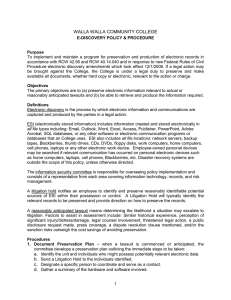
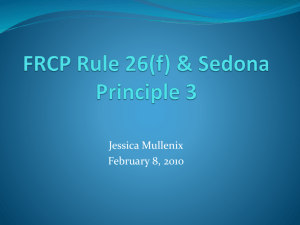
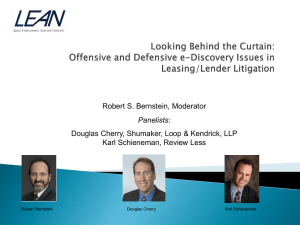
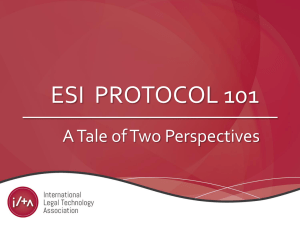

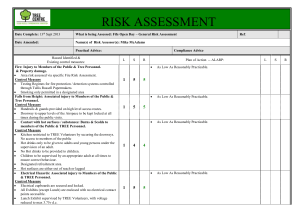
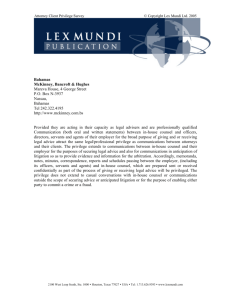

![[Insert company logo] Attorney Work Product Privileged and](http://s3.studylib.net/store/data/006611124_1-6f0e88671e9874b3d173badc2d939d92-300x300.png)
